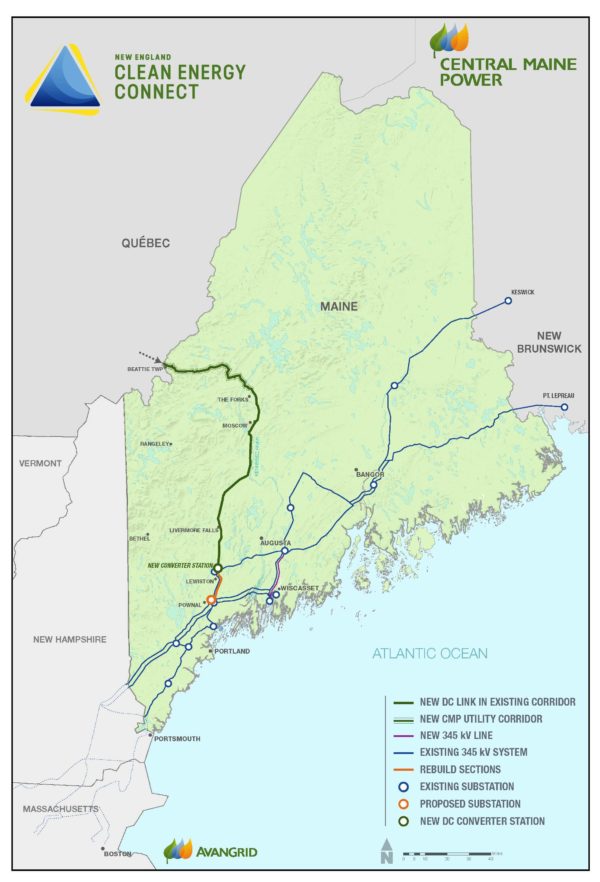By GARRY RAYNO, InDepthNH.org
Central Maine Power has until Wednesday to reach agreement with the three major electric distribution companies in Massachusetts to transport 1,200 megawatts of Hydro-Quebec electricity to the Bay State.
The contract was initially awarded to Northern Pass, the $1.6 billion, 192-mile transmission project from Pittsburg to Deerfield, but withdrawn by Massachusetts energy officials after the Site Evaluation Committee turned down Northern Pass’s application saying it would unduly interfere with the orderly development of the region.
The 20-year contract to provide renewable energy to Massachusetts customers is currently being negotiated among New England Clean Energy Connect officials and the three major electric distributors in Massachusetts, Eversource, the parent company of Northern Pass, National Grid and Unitil.
Speaking on a conference call with investors Monday, Jim Torgerson, Avangrid, Inc. CEO and director, said the company expects to file the negotiated agreements with Massachusetts Department of Public Utilities soon.
Avangrid is the parent company of Central Maine Power.
“(We are) very excited about the New England Clean Energy Connect project that was selected in the Massachusetts RFP,” Torgerson said on the conference call, “and we will be making a filing with the Mass DPU shortly for that project.”
The transmission project is currently before the Maine Public Utilities Commission seeking a Certificate of Public Convenience and Necessity to construct the 145-mile, above ground transmission line, at a cost of $950 million.
Two-thirds of the line is along a right-of-way controlled by Central Maine Power, with about 50 miles through what has been described as virgin forest.
“We have talked to the land owners,” Torgerson said. “They understand we are going to be building it and we are getting strong support from the communities involved.”
The project had moved through the Maine regulatory process fairly quickly until CMP was awarded the Mass. Clean Energy bid. Since that time a number of groups, including electric generators, other utilities and environmentalists have asked to intervene in the proceedings and have been approved but cannot revisit issues already settled in the docket.
Torgerson said the company hopes to have the Maine certificate by the end of the year, and final Massachusetts DPU approval next year.
Construction would begin in 2019 and be completed in 2022, he told investors.
One of the key reasons Northern Pass was selected for the Mass. Clean Energy project initially was the company claimed it would be completed by 2020, although that would appear to be unlikely now.
Northern Pass To File
Despite the setback, Northern Pass continues to push for New Hampshire regulators to revisit their decision to deny the application. Project officials have until April 30 to ask the Site Evaluation Committee to reconsider its decision.
“We will file with the SEC a Motion for Reconsideration” said project spokesman Martin Murray. “The deadline is Monday, April 30. Our filing may occur sooner.”
He said there is a market for additional clean hydroelectric energy beyond the 1,200 megawatts for the Massachusetts project.
“An editorial in yesterday’s Sunday Globe does a good job of spelling out the significant challenge the region finds itself in, in terms of replacing the existing fossil-fueled baseload power plants that New England remains dependent on,” Murray said. “Northern Pass requires a New Hampshire permit in order to build. That will remain the case no matter what happens, or doesn’t happen, between Massachusetts and HQ/CMP.’
After Northern Pass files its motion for reconsideration, intervenors and the Counsel for the Public have 10 business days to file responses.
The Site Evaluation Committee scheduled deliberations on the motion to reconsider May 24 and June 4 if necessary.
If the SEC denies the motion to reconsider the project, Eversource has said it would appeal the decision to the state Supreme Court, a process that would take about a year for a decision.
Northern Pass was proposed in 2010 when natural gas prices drove electric prices higher. Since that time the price of natural gas and electricity has dropped, but increased this winter with the extended cold weather.
Garry Rayno may be reached at garry.rayno@yahoo.com





